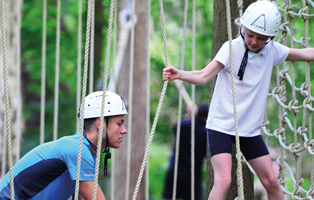
When I was 17, I spent three weeks of my summer holiday planning and delivering a holiday to a group of children from a school in Cheshire who had severe learning difficulties.
Independent Schools Inspectorate (ISI) inspection reports always include detail of the schools’ commitment to SMSC, but what does SMSC actually mean? As there is no requirement for independent schools to have a separate SMSC policy, what should you be looking for when searching for a school that genuinely provides a holistic education?
Boarding schools devote a lot of time and resources to activities outside the classroom to develop character, resilience and skills which will equip pupils for their adult world. You will not find a prescribed checklist of what a school will be providing under the SMSC or holistic education umbrella. It is about how a school:
Analysing each component in more detail, the spiritual element of SMSC requires that schools allow pupils to be reflective about their own beliefs – religious or otherwise – and allow this to inform their perspective on life and their respect for others people’s faiths and values. Spirituality is one of the eight aptitudes Wellington College promotes among pupils. Yes, we have weekly chapel services and assembly where faith is explored, but for some it is equally important to recognise their spiritual moment might come on the hockey pitch when they score that winning goal in a cup game or in the orchestra when performing a piece of beautiful music. At Wellington we encourage pupils to stand still sometimes and appreciate the awe and beauty around them and we find this encourages them to be imaginative and creative in their learning.
I believe a level of a pupil’s spiritual development is reflected by their curiosity. So look for schools where the pupils are inquisitive about the world around them and where they are nurtured to demonstrate a captivation about knowledge – not just for the sake of examinations, but because it is interesting and inspiring.
There is possibly no better environment than a boarding school to develop a young person’s moral compass. Living in close proximity with others where they have to share their space (often with others who they might not ordinarily choose to be friends with) means they develop their social intelligence through understanding the consequences of their behaviour and action.
Schools which encourage approaches such as restorative justice and mediation when dealing with matters of discipline enable the understanding of others to flourish and, in turn, levels of respect to grow. Young people in boarding schools quickly learn to appreciate the viewpoint of others, to listen and to value them. Schools that get it just right don’t have a long list of rules; the pupils get it right because they simply want to.
Service to others is a long tradition in boarding schools. A boarding school which excels at service allows ample opportunity for young people to participate in the local community, volunteering across a wide range of projects. Teamwork and cooperation are developed, as well as a heightened sense of wellbeing from knowing that you are helping others. If a school allows its pupils to interact and socialise with individuals from different backgrounds – religious, ethnic or socio-economic – they are giving them the opportunity to understand that everyone has their own strengths and weaknesses and all should be listened to; a vital skill if those young people are to go forward and contribute positively to their own communities in later life.
Finally, the cultural aspect. This is not just about providing opportunities for pupils to paint a picture or learn a musical instrument, it is much more how a school develops a pupil’s understanding and appreciation of their own heritage and the heritage of others. Society is a diverse place and our young people are helped to recognise this through opportunities to participate in cultural experiences, for example, celebrating Chinese New Year, Yom Kippur or Thanksgiving, or contributing to a mock general election so they develop an understanding of a democratic parliamentary system.
SMSC is done well when you cannot tell it is even happening. There is a synergy between the ethos of the school and the opportunities it provides; personal development is imbued within every lesson, every activity and within the boarding house. It is a school where:
Our boarding schools aim to bring out all the capabilities and sensitivities of pupils, allowing them to live purposefully, creatively and morally in today’s complex world. This is indeed a priceless education.
Subscribe / latest articles and news from our schools